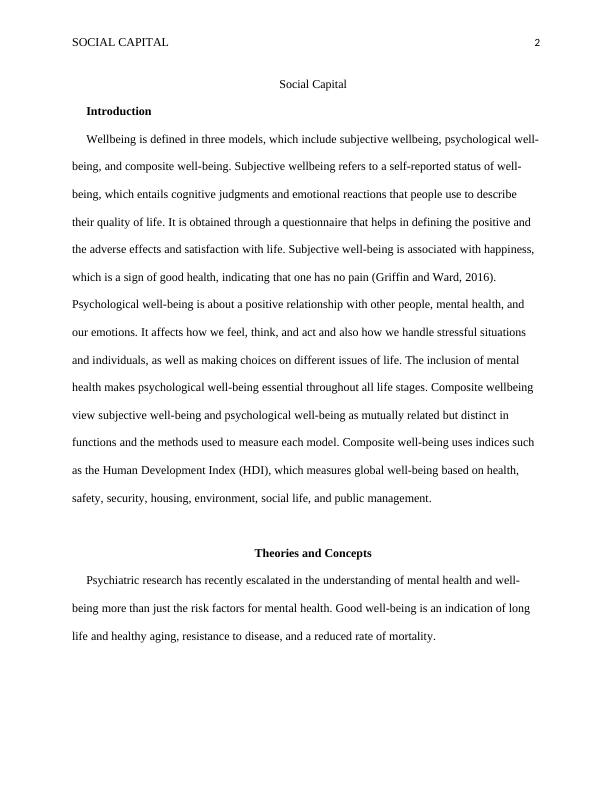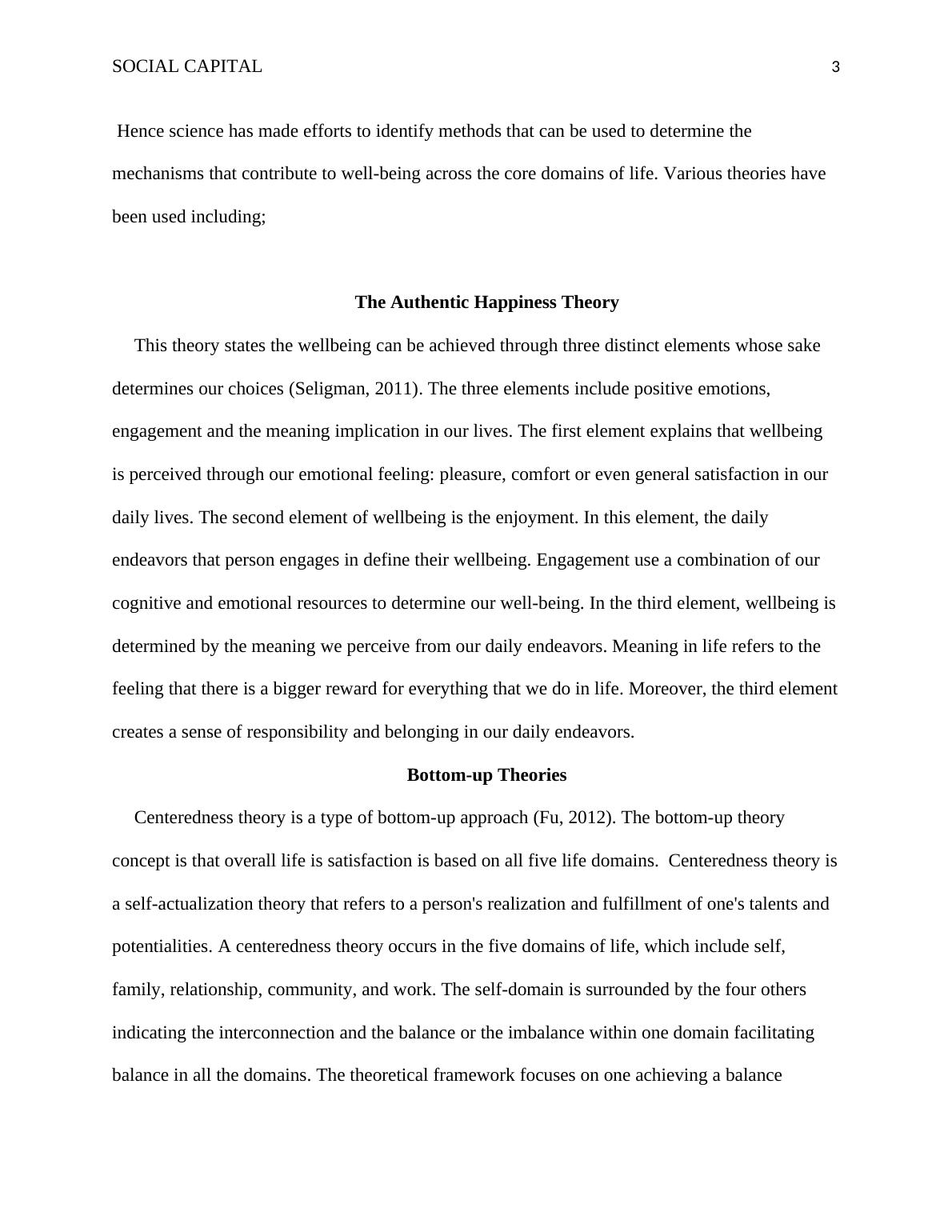Social Capital Research 2022
8 Pages2099 Words21 Views
Added on 2022-09-29
Social Capital Research 2022
Added on 2022-09-29
ShareRelated Documents
Running head: SOCIAL CAPITAL 1
Social capital
Name
Institution
Social capital
Name
Institution

SOCIAL CAPITAL 2
Social Capital
Introduction
Wellbeing is defined in three models, which include subjective wellbeing, psychological well-
being, and composite well-being. Subjective wellbeing refers to a self-reported status of well-
being, which entails cognitive judgments and emotional reactions that people use to describe
their quality of life. It is obtained through a questionnaire that helps in defining the positive and
the adverse effects and satisfaction with life. Subjective well-being is associated with happiness,
which is a sign of good health, indicating that one has no pain (Griffin and Ward, 2016).
Psychological well-being is about a positive relationship with other people, mental health, and
our emotions. It affects how we feel, think, and act and also how we handle stressful situations
and individuals, as well as making choices on different issues of life. The inclusion of mental
health makes psychological well-being essential throughout all life stages. Composite wellbeing
view subjective well-being and psychological well-being as mutually related but distinct in
functions and the methods used to measure each model. Composite well-being uses indices such
as the Human Development Index (HDI), which measures global well-being based on health,
safety, security, housing, environment, social life, and public management.
Theories and Concepts
Psychiatric research has recently escalated in the understanding of mental health and well-
being more than just the risk factors for mental health. Good well-being is an indication of long
life and healthy aging, resistance to disease, and a reduced rate of mortality.
Social Capital
Introduction
Wellbeing is defined in three models, which include subjective wellbeing, psychological well-
being, and composite well-being. Subjective wellbeing refers to a self-reported status of well-
being, which entails cognitive judgments and emotional reactions that people use to describe
their quality of life. It is obtained through a questionnaire that helps in defining the positive and
the adverse effects and satisfaction with life. Subjective well-being is associated with happiness,
which is a sign of good health, indicating that one has no pain (Griffin and Ward, 2016).
Psychological well-being is about a positive relationship with other people, mental health, and
our emotions. It affects how we feel, think, and act and also how we handle stressful situations
and individuals, as well as making choices on different issues of life. The inclusion of mental
health makes psychological well-being essential throughout all life stages. Composite wellbeing
view subjective well-being and psychological well-being as mutually related but distinct in
functions and the methods used to measure each model. Composite well-being uses indices such
as the Human Development Index (HDI), which measures global well-being based on health,
safety, security, housing, environment, social life, and public management.
Theories and Concepts
Psychiatric research has recently escalated in the understanding of mental health and well-
being more than just the risk factors for mental health. Good well-being is an indication of long
life and healthy aging, resistance to disease, and a reduced rate of mortality.

SOCIAL CAPITAL 3
Hence science has made efforts to identify methods that can be used to determine the
mechanisms that contribute to well-being across the core domains of life. Various theories have
been used including;
The Authentic Happiness Theory
This theory states the wellbeing can be achieved through three distinct elements whose sake
determines our choices (Seligman, 2011). The three elements include positive emotions,
engagement and the meaning implication in our lives. The first element explains that wellbeing
is perceived through our emotional feeling: pleasure, comfort or even general satisfaction in our
daily lives. The second element of wellbeing is the enjoyment. In this element, the daily
endeavors that person engages in define their wellbeing. Engagement use a combination of our
cognitive and emotional resources to determine our well-being. In the third element, wellbeing is
determined by the meaning we perceive from our daily endeavors. Meaning in life refers to the
feeling that there is a bigger reward for everything that we do in life. Moreover, the third element
creates a sense of responsibility and belonging in our daily endeavors.
Bottom-up Theories
Centeredness theory is a type of bottom-up approach (Fu, 2012). The bottom-up theory
concept is that overall life is satisfaction is based on all five life domains. Centeredness theory is
a self-actualization theory that refers to a person's realization and fulfillment of one's talents and
potentialities. A centeredness theory occurs in the five domains of life, which include self,
family, relationship, community, and work. The self-domain is surrounded by the four others
indicating the interconnection and the balance or the imbalance within one domain facilitating
balance in all the domains. The theoretical framework focuses on one achieving a balance
Hence science has made efforts to identify methods that can be used to determine the
mechanisms that contribute to well-being across the core domains of life. Various theories have
been used including;
The Authentic Happiness Theory
This theory states the wellbeing can be achieved through three distinct elements whose sake
determines our choices (Seligman, 2011). The three elements include positive emotions,
engagement and the meaning implication in our lives. The first element explains that wellbeing
is perceived through our emotional feeling: pleasure, comfort or even general satisfaction in our
daily lives. The second element of wellbeing is the enjoyment. In this element, the daily
endeavors that person engages in define their wellbeing. Engagement use a combination of our
cognitive and emotional resources to determine our well-being. In the third element, wellbeing is
determined by the meaning we perceive from our daily endeavors. Meaning in life refers to the
feeling that there is a bigger reward for everything that we do in life. Moreover, the third element
creates a sense of responsibility and belonging in our daily endeavors.
Bottom-up Theories
Centeredness theory is a type of bottom-up approach (Fu, 2012). The bottom-up theory
concept is that overall life is satisfaction is based on all five life domains. Centeredness theory is
a self-actualization theory that refers to a person's realization and fulfillment of one's talents and
potentialities. A centeredness theory occurs in the five domains of life, which include self,
family, relationship, community, and work. The self-domain is surrounded by the four others
indicating the interconnection and the balance or the imbalance within one domain facilitating
balance in all the domains. The theoretical framework focuses on one achieving a balance

End of preview
Want to access all the pages? Upload your documents or become a member.
Related Documents
Changing Concepts of Well Beinglg...
|11
|2852
|64
A Reflection on Psychological Well Beinglg...
|6
|1362
|461
Mental Health and Well-being in Covid 19 Emergency Service Workerslg...
|14
|4289
|61
Mental Health and Wellbeinglg...
|13
|3810
|63
Social Determinants of Mental Health for Indigenous Australianslg...
|10
|2332
|268
Wellbeing in Childrenlg...
|9
|2682
|36
